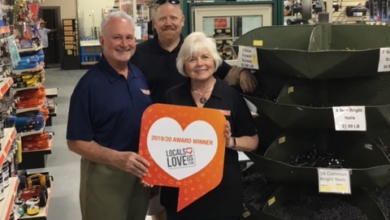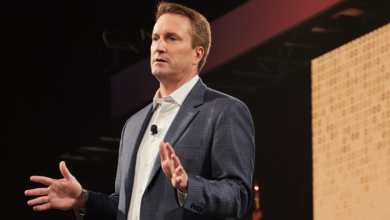International Inspiration: 8 Ideas from Outside the U.S. that American Dealers Should Consider Copying
By Craig Webb —

Thierry Garnier, CEO of Kingfisher plc and president of the EDRA/GHIN dealer association, talks about sustainability at the start of the Global-DIY Summit.
Their languages may differ, but construction supply dealers the world over share the same mission: Serve the customer, engage employees and turn a profit. Thus, it made sense for me to travel to Berlin on June 14-16 to learn the best management ideas from outside U.S. borders. Here are eight, drawn from the 9th Global DIY-Summit, attended by more than 1,000 home center executives and product suppliers from 55 countries.
The DIY-Summit is supported by EDRA/GHIN, an umbrella group of retailing associations, and the Home Improvement Manufacturers Association, an association of home improvement suppliers.

Erwin Van Osta merged Belgium’s pro-oriented Plafomat with DIY store Hubo to improve both group’s operations and sales.
1. Celebrate Talented Workers
Erwin Van Osta is co-founder and CEO of Hubo, a chain of 160 stores in Belgium with annual revenue of nearly $1.1 billion, as well as president of BricoAlliance, a collection of nine different DIY chains with stores in a dozen countries. He is blunt and driven: “Just f***ing do it!” is his catchphrase when dealing with staff. And staffers respond. Employees spontaneously organize charity events and are featured with their kids in lots of Hubo’s ads.
The company also organizes events in which the employees are the CEO—in this case, the Chief Entertainment Officer. The company puts on a slickly produced show called “Hubo’s Got Talent,” in which employees sing, dance, and show other skills. Among the prizes is one year of professional coaching.

A typical Byggmax store layout, of which only 20 percent is under cover.
2. Run Lean Stores
The Sweden-based Byggmax Group operates 218 stores in four Nordic countries, generating roughly $680 million in sales last year. It has a 7.0 percent EBITDA margin thanks to its low-price focus. The stores typically have only two to three employees, customers load all the products, payment is made at self-service kiosks (after an employee at a gate checks what’s been loaded) and all administrative duties are handled by the central office. Each store carries about 3,000 to 6,000 SKUs designed to handle roughly 300 home improvement tasks. Large-volume product requests are drop-shipped directly from the manufacturer.
Now it is growing in two ways. Byggmax Studio, launched last December with two stores, is a showroom-only facility focusing on 300 SKUs of flooring and tile. Products sold are shipped directly to the buyer’s home. Byggmax recently unveiled software customers can use to combine preplanned home modules that can be built in just two days.

Part of GooDay’s web home page.
3. Start with the Free Stuff
When Takashi Yanase joined his family’s GooDay home improvement chain in 2008, the Kyushu, Japan-based chain basically had no company e-mail, no website and a computer system that consisted of just one terminal in each store. Before its monthly managers’ meetings, the company would print roughly 10,000 pages—100 for each recipient. Clearly, the company had to make big changes, but how could GooDay afford the technology needed?
Yanase turned to Google’s free software. In 2015, Gmail replaced interoffice mail, and Google Meet supplanted most out-of-office gatherings. GooDay also began using Google’s free document, spreadsheet and presentation software.
Eventually, the company’s data moved into the Cloud, where GooDay uses Google’s BigQuery software to process the data and Tableau software to create meaningful charts and maps.
“We’ve gone from data that didn’t make sense to meaningful data that can be used to predict the future,” Yanase said. The change has been so successful that the company has grown to 63 stores with $280 million in sales, and Yanase has created a side business, Kaho Enterprise, to help build systems for other companies. And there’s also GooDay Data Academy, which trains employees on data management. Coming soon: An in-store device that uses voice recognition system to locate products on the shelves.









